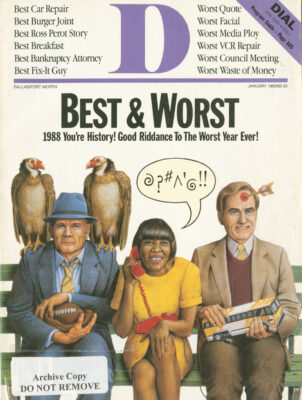I’ve never seen such a strong negative slant in newspaper coverage, especially in the sports pages.” says Marvin Edwards, general superintendent of the Dallas Independent School District. During the days in November when the Carter High School grade-changing, no-pass, no-play story was unfolding, it was difficult to discern from news accounts the facts of the story. Adding to the confusion, editorial page writers and sports columnists, who generally have more time to think before they write, used the Carter affair to lambaste the state’s tendency to value winning football over education. With the facts of the story being reported in fits and starts, did Carter and the DISD get a fair shake?
“Like a lot of complex Stones, it unfolded somewhat chaotically,” says Bob Mong, deputy managing editor in charge of news at The Dallas Morning News. “It was a tough story to cover.” The story was really three stories in one: the eligibility of the Carter football team, which had its eye on a state championship; the question of who ha s the authority to say that a no-pass, no-play rule has been broken; and finally, what had actually happened at Carter High School in light of the school’s and the DISD’s grading policy. Naturally, the emotionally charged football issue got the most play in the daily reporting and was closely tied to the ongoing legal wrangle over Carter’s eligibility.
“We were trying to be very-careful because it was a moving playing field.” says Rena Pederson, the editorial page editor of the News. Still, the News ran two editorials condemning Carter for circumventing the no-pass, no-play rules and for lowering educational standards, A November 18 editorial said that Carter had been placed on probation by the UIL “for establishing a grading system that enabled the football players to compete even though they had failing test scores.” That was the News’s first mistake. A News story the day before had correctly reported that Carter was put on probation for failing to report grade changes to the UIL for football players Gary Edwards and Ramon Wright. UIL rules do not forbid grade changes, but the UIL does penalize schools that do not report such changes. The grading system itself has nothing to do with it.
A second editorial, on November 22. bemoaned the “fact” that test scores at Carter were “only one of four factors in the students’ final grades,” and scolded the school with this admonition: “lessen[ing| the impact of test scores comes dangerously close to the social promotion that was abandoned by the school district several years ago.” Wrong again. The News had correctly reported at least three times before that Carter’s grades were based equally on homework, class participation, weekly test scores, and a final six-weeks exam. Half the final grade, in other words, is based on testing. Carter High School students actually take tests more often than many other students in the DISD.
Henry Tatum, associate editor of the editorial page for the News and the person who researched and wrote the two editorials, says he normally relies on news reports from his own paper. But Tatum admits that he got the facts wrong-and he agrees that if the facts were wrong, then the conclusions of the editorials must be called, into question. Does that mean the News will change its editorial opinion? Pederson says the editorial staff is always judging and formulating what editorials to run based on the latest information available.
The Dallas Times Herald was much more restrained in its editorial of November 18. condemning the noisy rabble of the arguing adults more than Carter’s grading policy. But Herald sports columnist Frank Luksa fell into the same trap as the rival paper. Said Luksa in his November 19 column, “A student [at Carier] who does no work receives a grade of 50 instead of the zero he earned.” Luksa would only have had to read his own paper or call the DISD to discover his error. “If you do no work” says Marvin Edwards (speaking of students, not journalists), “you get a zero.”
Both papers “really indicted the whole school district.” says school board member Betty Vondracek. “The impression you get is that we were out of our minds to have this plan (at Carter). But the foundation for that plan was solid.” Edwards agrees; the Carter plan “does not lower standards.” he says. “It increases student activity within the course. It increases standards.” And although Edwards is reluctant to criticize either paper, he clearly wishes that more facts had gone into the opinions.
Related Articles

Arts & Entertainment
VideoFest Lives Again Alongside Denton’s Thin Line Fest
Bart Weiss, VideoFest’s founder, has partnered with Thin Line Fest to host two screenings that keep the independent spirit of VideoFest alive.
By Austin Zook

Local News
Poll: Dallas Is Asking Voters for $1.25 Billion. How Do You Feel About It?
The city is asking voters to approve 10 bond propositions that will address a slate of 800 projects. We want to know what you think.

Basketball
Dallas Landing the Wings Is the Coup Eric Johnson’s Committee Needed
There was only one pro team that could realistically be lured to town. And after two years of (very) middling results, the Ad Hoc Committee on Professional Sports Recruitment and Retention delivered.


